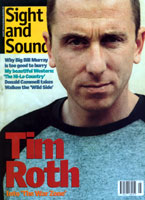Primary navigation

USA 1998
Reviewed by John Wrathall
Our synopses give away the plot in full, including surprise twists.
Oklahoma, the 70s. After being beaten up, teenage junkie Bobbie is nursed back to health by Mel, a friend's uncle, who gives him heroin to kill the pain. Mel and his girlfriend Sid take Bobbie and his girlfriend Rosie under their wing. Bobbie helps Mel steal speed from a clinic, but they are double-crossed by the white-supremacist gang to whom they try to sell the pills. In the ensuing gunfight, Mel is wounded and the four supremacists killed. On the run, the 'family' take refuge in the home of Reverend, a gun-dealing minister. When they have recovered, Mel contacts Jewels, a gangster who recruits him to rob a jeweller's shop, arranged by the jeweller himself as an insurance scam. Mel and Bobbie break into the jeweller's safe, but find it empty. Returning to the motel where they are staying, Bobbie finds Rosie dead from a heroin overdose.
Mel, Bobbie and Sid go to the home of the jeweller who double-crossed them. Bobbie finds Jewels torturing the jeweller; trying to make him stop, Bobbie accidentally shoots Jewels. The jeweller's wife pays Sid the money they're owed but as the jeweller and his wife are witnesses to Jewels' murder, Mel kills them. Stopping as they make their getaway, Mel tells Sid he is planning to kill Bobbie. Sid warns Bobbie, who runs away. When he finds out, Mel punches Sid. Then they drive off together, apparently reconciled.
Tulsa, Larry Clark's 1971 book of photographs of drug buddies in his Oklahoma hometown, was an acknowledged influence on Gus Van Sant's Drugstore Cowboy, a similarly non-judgmental look at the outlaw lifestyle of a bunch of 70s junkies. Van Sant repaid the favour by executive-producing Clark's first feature, Kids. And now Clark has returned the compliment with his second feature, Another Day in Paradise, a film much closer in tone to Drugstore Cowboy's breezy, happy-go-lucky take on 'shocking' subject matter, than to the starker, grittier approach of Clark's previous work as photographer and film-maker. Like Drugstore Cowboy, Another Day in Paradise offers an intimate look at a surrogate family of drug-users drifting round 70s urban backwaters from one motel to the next, supporting themselves with low-rent heists until, inevitably, they get out of their depth. In contrast to the recent wave of slick 70s nostalgia, (see Boogie Nights), Clark's film actually feels as if it could have been made at the time, complete with grainy, low-contrast photography and a boom microphone wandering intermittently into shot. (Clark's quest for a certain brand of scratchy 70s authenticity is symbolised by the name of the production company he co-runs, Chinese Bookie Pictures, presumably after Cassavetes' 1976 classic, The Killing of a Chinese Bookie.)
Refreshingly, despite finding his original fame as a still photographer and for his meretricious Kids, Clark here seems more interested in performances than look or style. James Woods is one of the film's producers and it's not difficult to see why he leapt at the role of Mel after a decade of colourful but hardly taxing supporting turns in such films as Contact, Casino and Nixon. With the ceaseless self-justifying patter that shrouds his world-weariness, his horror at the open spaces of the countryside, his sudden explosions of violence and equally frightening mirth, Mel is a Woods creation par excellence, in the manic tradition of Salvador's Richard Boyle and The Boost's Lenny Brown.
With Woods on this sort of form, perhaps all a director needs to do is wind him up and point him in the right direction. But Clark deserves credit for extracting an equally striking performance from Melanie Griffith as Sid. The prospect of Griffith injecting herself in the neck, or toting a pump-action shotgun in a tight polo neck might sound laughable. But, against the odds, Clark discovers in her a bruised, Jeanne Moreau-like dignity as Sid struggles to keep the family together. Lou Diamond Phillips contributes a similarly revelatory cameo as the sequinned gangster Jewels. Holding one's own in this company would be a tall order for any inexperienced young actor. But the young leads Vincent Kartheiser and Natasha Gregson Wagner are disappointingly blank, cast more for their skinny, bedraggled, very Tulsa looks than for any performing spark.